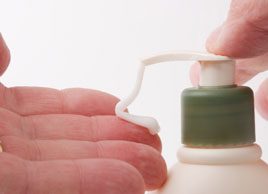3 ways to soothe eczema
While there’s no cure for eczema, you can soothe the symptoms. Here’s how

Source: Best Health Magazine, November 2011
For most people, itchy skin is an annoying sensation that soon passes. But for eczema sufferers, it can be agony. ‘Eczema’also known as dermatitis’is a condition in which the skin becomes so inflamed that it gets itchy, dry, red and irritated,’ says Dr. Harvey Lui, head of the department of dermatology and skin science at the University of British Columbia and director of The Skin Care Centre at Vancouver General Hospital. About 15 percent of Canadians will experience the most common type, atopic dermatitis, at some point.
‘Genetics are definitely a factor, but people with atopic dermatitis also have an imbalance in their immune system that leads to the release of inflammatory chemicals,’ says Dr. Vince Bertucci, a consultant dermatologist at Women’s College Hospital in Toronto and medical director at Bertucci MedSpa in Woodbridge, Ont. Those chemicals not only trigger eczema symptoms but also hay fever and asthma; the three diseases tend to appear together, although doctors aren’t exactly sure why.
Research also shows that people with eczema have an abnormal skin barrier, adds Lui. ‘It doesn’t hold on to enough water’so it’s dry’and it allows too many irritants, microbes, allergens and toxins to enter the body, causing inflammation.’
Most adult sufferers first experience eczema in childhood (when it’s most prevalent), although it’s possible to develop the condition for the first time as a grown-up. ‘It affects women and men equally, and can turn up anywhere, but the hands, neck, back of the knees and inside of the elbows are typical spots. (Another form of eczema, contact dermatitis, arises only at skin sites directly in contact with certain materials that people can develop an allergy to, such as nickel, rubber or permanent hair dye.)
There’s no cure for eczema, but there are treatments, and it’s important to use these to keep symptoms under control. Scratching repeatedly can thicken the skin and lead to scarring; if the skin is broken, it becomes vulnerable to bacterial or viral infections such as impetigo (a contagious infection caused by staphylococcus or streptococcus bacteria). See a physician if you suspect infection, if your skin is cracked or oozing, or if you’ve tried over-the-counter treatments for one to two weeks without success, says Bertucci. Otherwise, seek relief with these remedies as your first line of defence.
To reduce and prevent dryness caused by eczema
Try: Curel Itch Defense Lotion; Aveeno Eczema Care Cream; Cetaphil Restoraderm Eczema Moisturizing Lotion
How they work: For mild cases of eczema, applying moisturizer may be enough to control symptoms and prevent future attacks, says Lui. ‘Ceramides [lipid molecules found in all three product examples listed] help retain water and help hold it in the skin by maintaining the moisture barrier,’ says Joy Bhimji, pharmacy manager at Rexall Pharmacy in Westbank, B.C. ‘Our skin already contains ceramides, but in eczema sufferers there are fewer of them.’ In Aveeno Eczema Care Cream, the natural colloidal oatmeal soothes dryness and irritation.
Need to know: After bathing or showering, pat your skin dry and while it’s still damp (within three to five minutes), apply moisturizer all over your body’not just on affected areas. Reapply at least once daily, or whenever skin gets wet or feels dry.
To decrease inflammation and itching from eczema
Try: Rexall Hydrocortisone Cream USP 0.5% With Aloe; Life Brand Hydrocortisone Cream 0.5%; Spectro EczemaCare Medicated Cream
How they work: Available in a 0.5 percent concentration over the counter (higher strengths must be prescribed by a physician), hydrocortisone, found in the Rexall and Life Brand creams, is a mild steroid that reduces swelling, itchiness, pain and redness. Clobetasone butyrate, another topical steroid, is found in Spectro EczemaCare Medicated Cream; some research suggestsit is more effective than one percent hydrocortisone in treating eczema, says Bhimji.
Need to know: Apply a thin layer of cream once or twice daily to affected areas only (Bertucci suggests applying your moisturizer everywhere else). Don’t put it on broken skin or anywhere that might be infected; instead, see a doctor. Because overuse can thin the skin’in some cases, permanently’Lui doesn’t recommend trying steroid-based creams for more than a week without the supervision of a physician; you’ll also need to stop using them once the condition clears up.
To relieve itching due to eczema
Try: Claritin Allergy; Aerius Allergy; Benadryl Allergy Liqui-Gels; Reactine Allergy
How they work: ‘Oral antihistamine medications can help combat the effect of histamine, one of the inflammatory chemicals released in the skin of people with eczema,’ says Lui. ‘But it’s important not to rely solely on them, as they’re only part of the solution.’ Loratadine (in Claritin), desloratadine (in Aerius), and cetirizine (in Reactine) are antihistamine ingredients that will relieve itch without causing drowsiness. Diphenhydramine hydrochloride (in Benadryl) can be an effective ingredient for blocking histamine, says Bhimji, but does cause drowsiness. (‘If scratching is keeping you awake, the sedative effect can be a good thing,’ adds Lui.)
Need to know: Claritin, Aerius and Reactine should only be taken once a day. Claritin is safe for women who are pregnant or breastfeeding. Anyone using other medications should check with a physician or pharmacist before taking an oral antihistamine. If you take Benadryl, follow package directions, but avoid it if you need to be alert or are driving or operating machinery.
This article was originally titled "Eczema relief" in the November 2011 issue of Best Health. Subscribe today to get the full Best Health experience’and never miss an issue!




